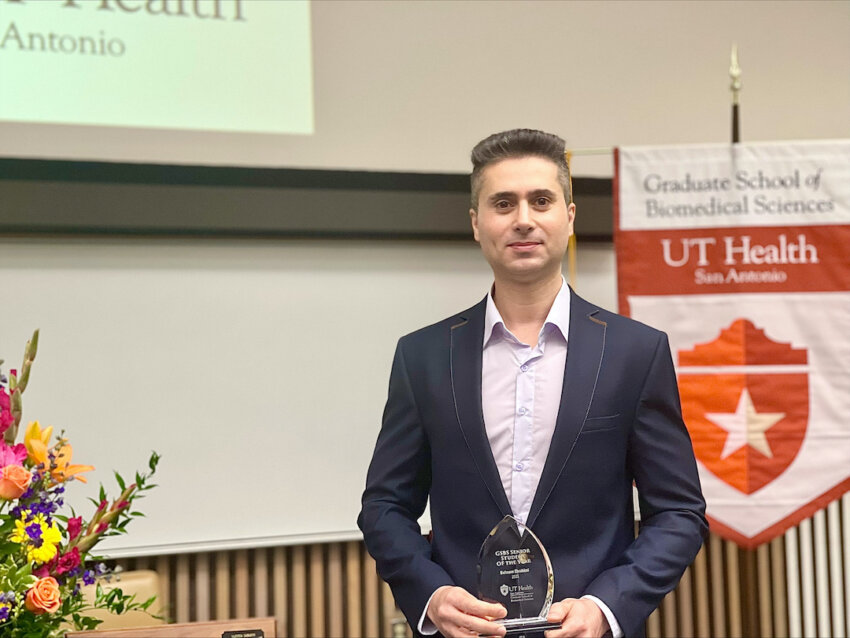Behnam Ebrahimi, a PhD candidate in the Graduate School of Biomedical Sciences, has recently received a highly esteemed fellowship award from the National Cancer Institute (NCI) of the National Institutes of Health.
The NCI Predoctoral-to-Postdoctoral Fellow Transition (F99/K00) award, which has no nationality restriction, supports outstanding PhD and other research doctoral candidates as they complete their dissertation research training (F99 phase)and transition to mentored, cancer-focused postdoctoral research positions (K00 phase).
The F99/K00 award is very competitive, with each institution allowed only one application and NCI funding no more than 24 nationwide each year.
“Ebrahimi’s impressive achievement places UT Health San Antonio among the top research institutions in the country to have received this award,” said Babatunde “Kay” Oyajobi, MBBS, PhD, MBA, professor in the Department of Cell Systems and Anatomy and director of the Office of Postdoctoral Affairs who directs F-Troop, a grant-writing workshop for trainees applying for extramural fellowships. “Since the inception of this annual nationwide competition in 2016, this is only the third F99/K00 award funded at our institution.”
With this funding, Ebrahimi is researching new approaches to treating ovarian cancer, which is the most lethal gynecologic malignancy in the US and is often resistant to chemotherapy, Ebrahimi said. His research is investigating mechanisms of the Leukemia Inhibitory Factor Receptor (LIFR), which is located on the surface of the cancer cells and serves as a conduit for Leukemia Inhibitory Factor (LIF) signaling that supports the growth of ovarian cancer.
Using a novel LIFR inhibitor called EC359, developed in the lab of his mentor, Ratna Vadlamudi, PhD, professor and vice-chair for research in the Department of Obstetrics and Gynecology, Ebrahimi is investigating whether disruption of LIF/LIFR signaling will sensitize chemo-resistant cells and delay the development of chemotherapy resistance.
“My studies have shown that EC359 inhibits cancer cell antioxidant functions, allowing oxidations that occur during metabolism to cause a particular type of cell death known as ferroptosis,” Ebrahimi said. “The finding that EC359 induces ferroptosis is crucial because it offers alternative ways to kill ovarian cancer cells utilizing a cutting-edge EC359 treatment in addition to chemotherapy, reducing the likelihood that the tumor would develop chemotherapy resistance.”
So far, Ebrahimi says he has made significant strides in the predoctoral portion of his fellowship and is “eagerly anticipating the opportunity to explore new avenues of cancer research as a postdoctoral fellow.”


